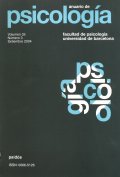Profile of students and their degree of commitment to their studies: Influence of burnout and engagement
Keywords:
Burnout, engagement, students, commitment.Abstract
This study analyses whether the three-dimensional perspective isthe best way to assess the burnout syndrome in a pre-professional group of university students, as has been extensively proven for professional groups. We also assess whether this syndrome can be defined as the positive cumulative result of exhaustion and cynicism and the negative cumulative
result of the lack of professional efficacy. In addition to the study of the relationship between burnout and its hypothetical opposite construct, engagement, the associated burnout and engagement scales are used to explain the level of commitment of this group towards their study. The psychosocial variables "intention to leaveu", "knowledge of the professional world" and "academic perjormance" are used to define the profile of committed students. Among the results of the study, based on a sample of 1.187 Business Management students (LADE) at the University of the Basque Country (UPV) the most interesting are: a) As in professional groups, pre-professional burnout can be defined as the positive cumulative result of exhaustion and cynicism and the negative cumulative result of the lack of professional efficacy; b) In a second-order factor structure, neither the three burnout scales nor the three engagement scales cluster together into one separate burnout and engagement factor; c) There are two clearly different groups of students: those who are committed to learning, and those who are not; d) The level of commitment varies according to professional maturity, intention to leave and time the s~dbject expects to take to finish their studies.
Downloads
Published
2004-01-13
Issue
Section
Estudios
License
The authors who publish in this journal agree to the following terms:
Authors transfer to the publisher all copyright for the full term of protection and for all the world.
The authors can post a copy of their articles in accordance with the policy of free access to the journal.


